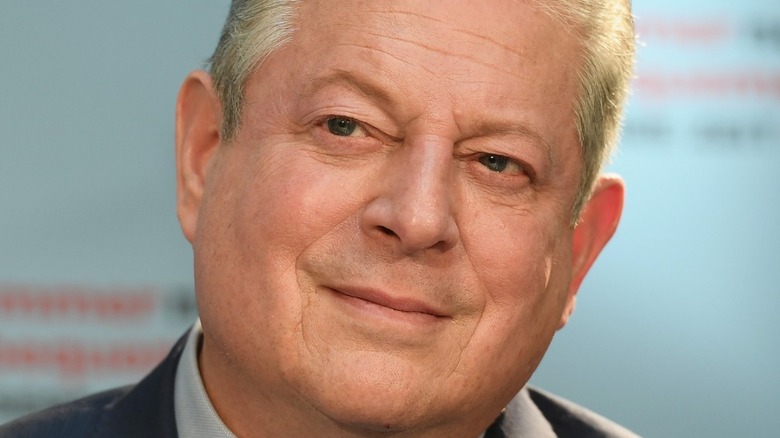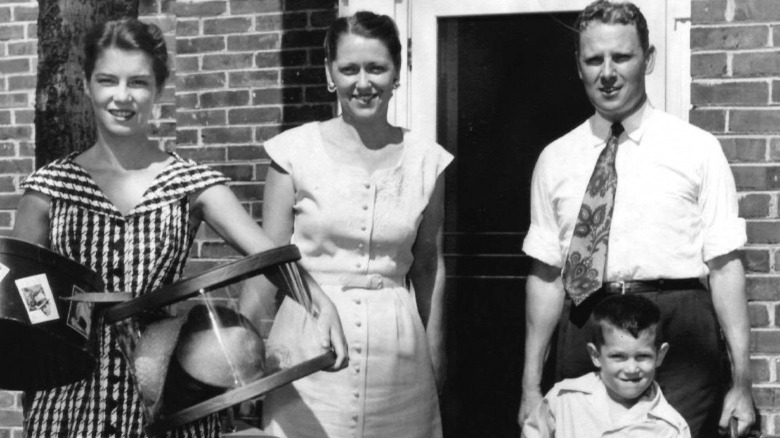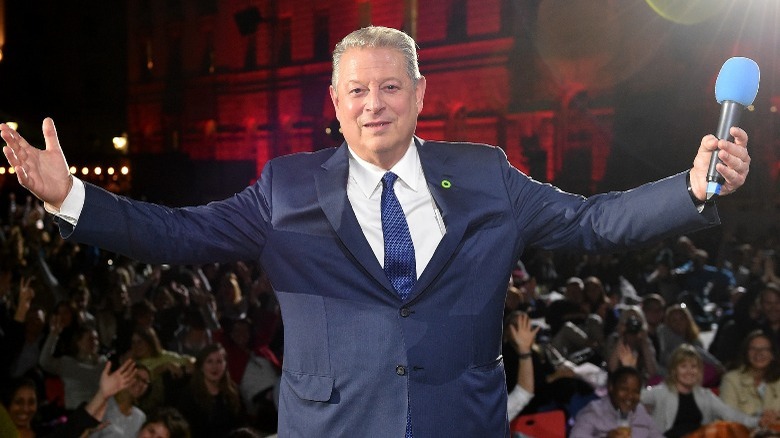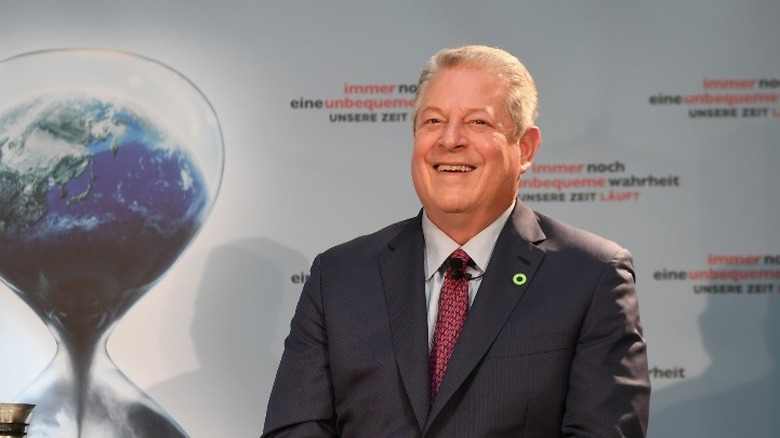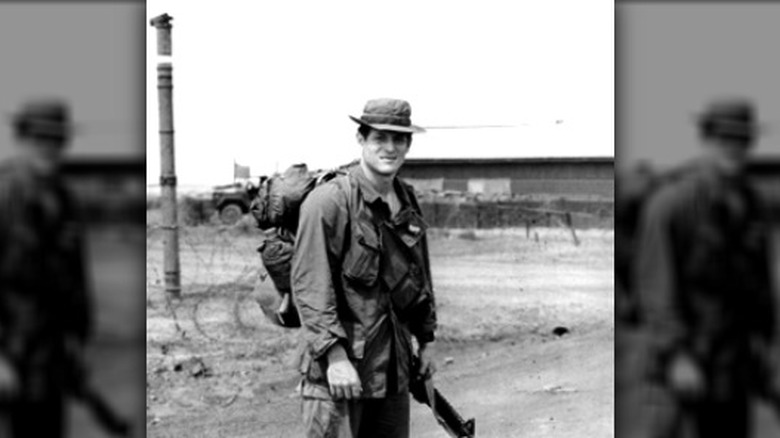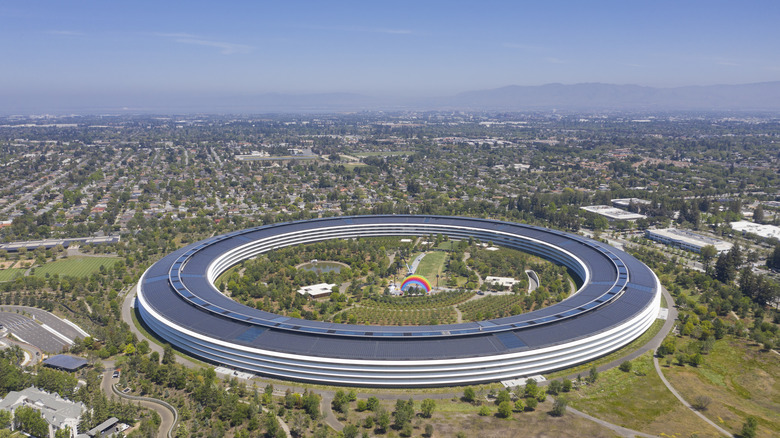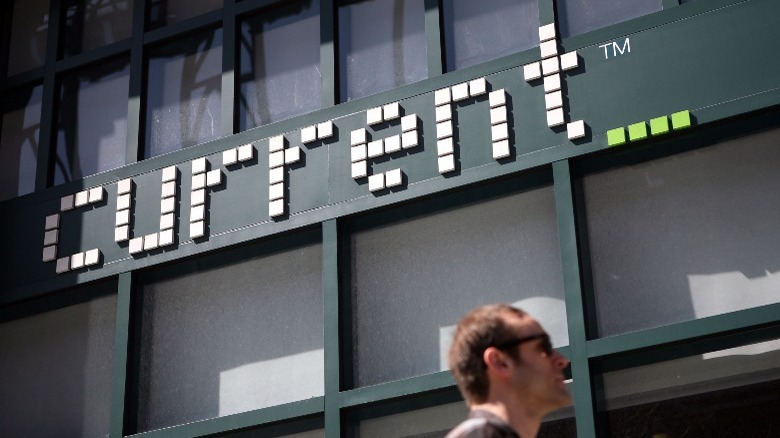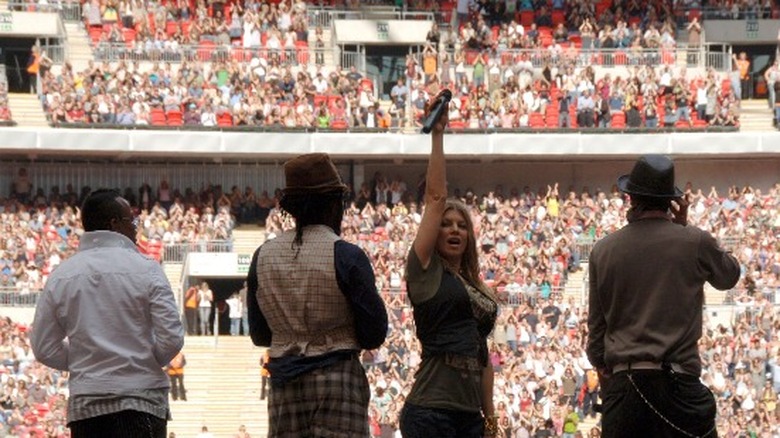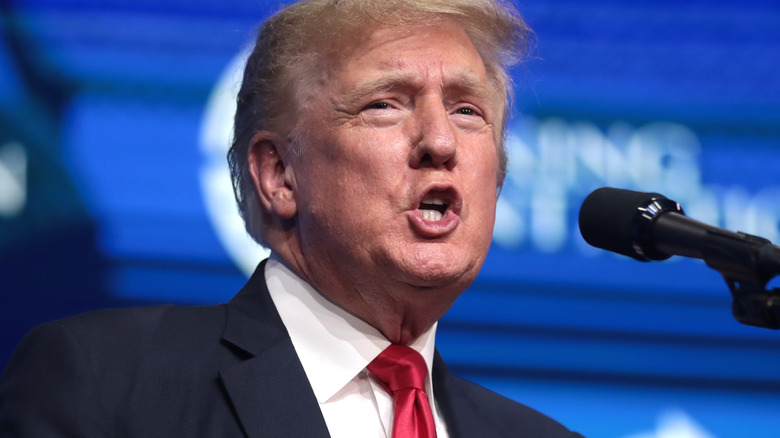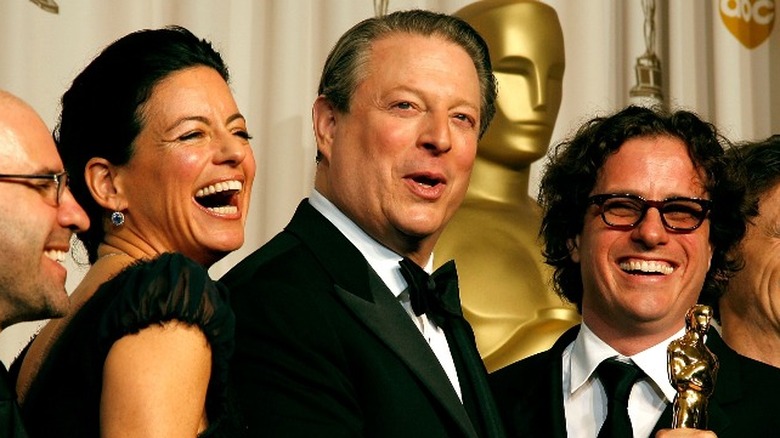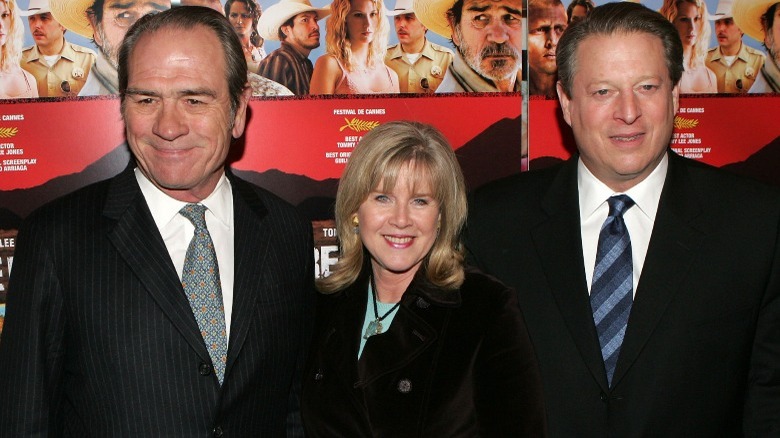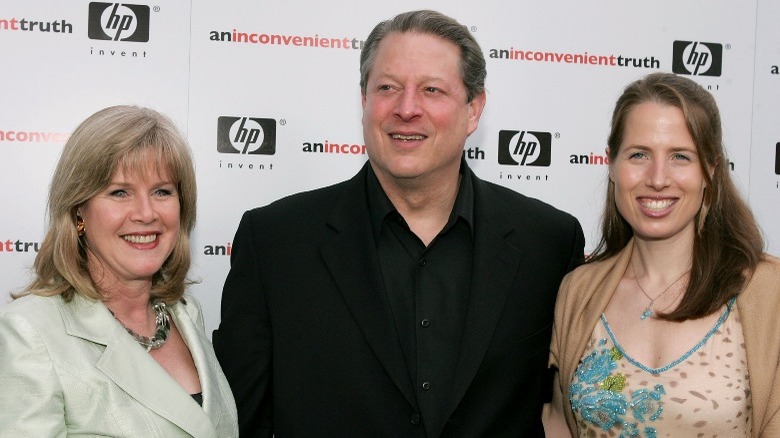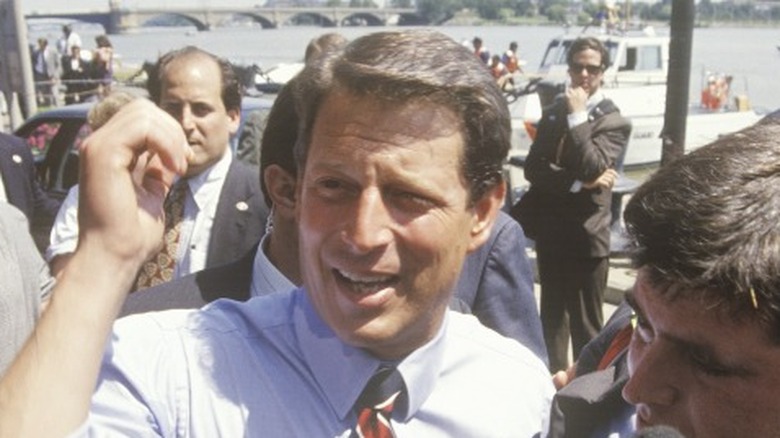The Untold Truth Of Al Gore
Al Gore is one of the most famous American politicians in modern history. He started his political career serving in the U.S. Congress in the 1970s, being elected to the U.S. House of Representatives from 1976 to 1985, and to the U.S. Senate from 1985 to 1993 (per Britannica). He then spent the next eight years serving as the 45th vice president of the United States, under President Bill Clinton. He ran unsuccessfully for president in 2000 against George W. Bush, in one of the closest and most controversial elections in American history. Gore actually won over half-a-million more popular votes than Bush, but Bush defeated him by one electoral college vote, winning the Presidency (via Britannica).
After the 2000 election, Gore retired from serving in the legislative and executive branches, and he went into the private sector to work on fighting global warming and climate change. He is probably most well known for his 2006 documentary and book, "An Inconvenient Truth," which won an Academy Award and covered climate change science. Subsequently, in 2007, he won a Nobel Prize for his work with global warming. Still, even though Gore has been in the public eye for more than four decades, there is a lot about the man even those who supported him do not know. This is the untold truth of Al Gore.
He worked on a farm growing up
Growing up, Al Gore (pictured with his family, age 4) did not exactly have a "normal" childhood. His father, Al Gore Sr., was a United States Senator, so the family spent much of their time in Washington D.C. (via The New York Times). However, Gore Sr. was originally from Tennessee, and still owned farmland there while working in Washington. As a result, Gore spent most of his childhood traveling back and forth between Carthage, Tennessee, and Washington D.C., spending several years growing up on his father's farm — and in many ways he considered Carthage his hometown, rather than D.C.
His parents thought that working on the farm would be good for their son's character: not only would it give him a good work ethic, they believed, but it would also "toughen him up" a little bit. The Gore's former housekeeper, Mattie Lucie Payne, recalled how Gore Sr. would wake up his son at 6 a.m. to work in the fields with the grown laborers. By all accounts, Gore did commendably hard work on the farm, and did not complain or throw fits when asked to do tasks.
He sometimes got into mischief on the farm, however, and one family friend referred to him as "pranky" during his time in Tennessee. Gore and his friend Steve would sneak out at night to go water skiing, and occasionally threw parties when their parents were out of town.
He was destined for politics from a young age
There were signs from an early age that the young Al Gore would eventually develop serious political tendencies. His father was a Senator, and he often used to take his son to sit in on Senate business (per The New York Times). The young Gore was very interested in a bill on the creation of interstate highways throughout the nation, and he even wrote his own notes about the progress of construction when he was at home. When he was 5 years old, he met then Vice President Richard Nixon on the Senate floor, and his father once even let him listen to a conversation he was having with President John F. Kennedy.
When Gore was just a 6-year-old boy, his parents had a story run in the local paper about him, and it remarked that "There may be another Gore on the way toward the political pinnacle" (per The Washington Post). The substance of the article was how Gore had persuaded his father into giving him a nice gift, and was quoted as exclaiming to his mother that he had just "out-talked a Senator." His father constantly gave him small lessons about political philosophy when he was young, and his parents used to hint at their political aspirations for him from time to time.
He was a bit of a daredevil growing up
Those familiar with the contemporary image of Al Gore — that of a reserved senior statesman — might be pretty surprised to learn that he was a bit of a wild child growing up. According to a profile of him in The Washington Post, when he was an adolescent, Gore had a penchant for some dangerous activities. When he was just 14 years old, he got his first learner's permit to drive, and his friend Steve Armistead recalled, "He was constantly running us into hog feeders and running us off the road."
A few years later, Gore tried to overtake a truck by quickly jetting around him from the left side, but the other vehicle swerved in front, and instead, Gore ended up totaling his father's 1962 Chevrolet Impala. He was also a fan of water skiing on the family's speedboat, and sometimes did handstands on the boat's engine. When he got a little bit older and was in college at Harvard, his tastes got even more extreme. He fancied riding motorcycles and would often drive his friends around Boston at blazing speeds (per The New York Times). He also reportedly had a penchant for trying to scare them by playing with his gears — while going 65 to 70 mph.
He was one of only a few graduates from his class to fight in Vietnam
When Al Gore graduated from Harvard University in 1969, the Vietnam War was raging in Southeast Asia. Though he was personally opposed to the war, Gore decided to enlist in the army (per The New York Times). There were over 1,100 graduates in his class at Harvard, but he was one of just a handful who enlisted and fought in the war. Part of his motivation was out of concern for others in his small town of Carthage, Tennessee. Gore knew that if he opted into the National Guard or got another waiver for school, then that would mean another Carthage boy would have to take his place in the army — and potentially become a casualty.
He went to basic training at Fort Dix, New Jersey, before getting stationed in Alabama, writing for "the Army Flier" newspaper. He and his colleagues on the paper would watch anti-war movies when they could, and Gore married his wife Mary Elizabeth "Tipper" Gore while working there.
He eventually found himself stationed in Bien Hoa, Vietnam, in January 1971, assigned to work as a photographer and journalist with the 20th Engineer Brigade. Though he never experienced combat himself, the area he was in was still very dangerous at times. Gore does not regret his time in Vietnam either, and he earned the respect of many of his fellow and superior officers during his service.
He is a member of Apple's board of directors, among others
Apple is widely known as one of the most socially conscious businesses in modern America. This includes the realm of fighting climate change, and they have made significant changes toward being more environmentally conscious (per Apple). Yet, most people do not realize that one of the biggest climate change fighters in the country, Al Gore, is actually on their board of directors. He was put on the board in 2003, just a few years after he left the White House as the outgoing vice president (via Apple). The press release from Apple touted Gore's commitment to positive environmental policies, highlighting his efforts in helping to build the internet and spreading it throughout the country.
Apple is not the only high-profile organization fighting for the environment that Gore is involved with. He is also on the board of directors for The Climate Reality Project, which he helped found. The project is committed to fighting climate change, and is an organization that unites activists, leaders, and scientists together to fight for a "global solution to the climate crisis." In 1998, Gore also proposed the Deep Space Climate Observatory satellite be created by NASA, which would allow anyone to view an image of the earth in real-time through the internet. It was eventually launched in 2015 by NASA.
He had his own television station: Current TV
Al Gore is famous for the several documentary films that he has made, including "An Inconvenient Truth" and its follow-up "An Inconvenient Sequel: Truth to Power," (via Britannica) but many people do not realize that he launched his own TV network in the early 2000s. According to ABC, in 2005, Gore launched Current TV, a supposedly new and revolutionary kind of TV network. The network had a mix of several different types of programming, including fashion, video games, economics, politics, and the environment. Gore served as the chairman of the board of directors at its launch, and joked that he was a "recovering politician" at the time.
The network was created to have the content be partially user-driven, and each half hour it featured a "Google Current report" that looked at search trends that were popular at the moment. Unfortunately, the network never became the revolutionary hit that Gore expected, and he ended up selling it to Al Jazeera for $500 million, netting himself as much as $100 million in the process (per Forbes). Much of Current's problems stemmed from "poor channel placement, low visibility, and a diffuse brand identity." It also struggled to retain star talent as lead anchors — and the high-profile exit of Keith Olbermann did not help.
He created a music festival to help fight climate change
As strange as it may seem today, Al Gore actually threw a rock festival in 2007. It was not quite Woodstock, but still featured a lot of celebrities, and was geared toward fighting climate change (via Salon). The festival was called Live Earth and took place simultaneously in 130 countries across the world at the same time. Over 2 billion fans were estimated to have attended or streamed the events, many of which were televised as well as shown on the web.
The list of artists was pretty diverse and included Bon Jovi, Madonna, and Alicia Keys — all delivering noteworthy performances. Sting and the Police also reunited for the concert, and they even connected for a duet with Kanye West that turned "Message in a Bottle" into a climate-fighting anthem. In 2015, Gore and artist Pharrell Williams announced that there would be another round of Live Earth concerts held that summer, but plans fizzled out, and instead, there was to be a free concert to be held in Paris, near the Eiffel Tower (via Yahoo).
He advised Donald Trump on climate change
Al Gore's commitment to fighting global warming and climate change knows no bounds. He is so dedicated to improving the environment that he even tried to lobby President-elect Donald Trump in late 2016, just after he had won the presidential election. According to CNN, Trump and Gore ended up having "a lengthy and very productive session," according to Gore, discussing some of the risks of climate change. Much of the reason for the meeting was that Trump had been on record expressing skepticism toward climate change, and Gore was one of Washington's biggest advocates for fighting for the environment at the time.
Another reason for the meeting was likely the topic of the Paris climate accords, which President Trump ended up withdrawing from just a few months later, when he was in office. When Trump did withdraw, Gore called the move "reckless" and "indefensible" (via CNN). He had been in contact with Trump's daughter Ivanka Trump for several months leading up to the decision, but he could not get an audience with the president himself.
He has written seven books
While older audiences might be familiar with Al Gore as a senator, vice president, and presidential nominee, younger audiences are typically more familiar with his documentaries. In 2006, Gore released his first documentary, "An Inconvenient Truth," — which won an Academy Award — and in 2017, he released "An Inconvenient Sequel: Truth to Power," both of which were primarily focused on discussing the science of global warming and climate change (via Britannica). Yet, what a lot of younger audiences might not realize, both documentaries are actually based on books of his that were released beforehand. And those are not the only books that Gore has written: in all, he has published seven books (via Al Gore's website) — all of them related to environmentalism and climate change.
Two of his books directly criticize the last two Republican presidential administrations. In 2007, he released "The Assault on Reason," which went after his opponent in the 2000 election, President George W. Bush, for creating an "environment dangerously hostile to reason." Ten years later, in 2017, he released "The Assault on Reason: 2017 Edition," which faulted Donald Trump for continuing the same trend of ignoring critical thinking and reason. One of his first books, "Earth in the Balance," was published in 1992 while he was still a senator.
He performed as a stand-up comic once in college
One of the more obscure connections in Al Gore's life is that he was the college roommate of famous actor Tommy Lee Jones. Al Gore was a 17-year-old freshman at Harvard University in 1965, and Jones was one of his first roommates (according to The New York Times). Gore partially chose Harvard because it was the alma mater of President John F. Kennedy, but, during his time there, it was often a hot spot for protests against the ongoing Vietnam War.
While at school, Gore would often listen to records by such artists as Bob Dylan, the Beatles, and Buffalo Springfield — but the real fun times he had were with Jones. At one point, the two of them got into a knife-throwing contest that lasted a month, and nearly destroyed an elm tree — they were working on their outdoorsman skills, apparently.
After his first year at school, Jones, Gore, and a few other friends created a musical revue, advertised as "The Old-Time Country Panorama, featuring those old-time country musicians of note, Tommy Lee Jones and the Ben Hill County Boys," according to The New York Times. Gore's position in the show was to be "the highly respected professor of animal husbandry and the curative sciences, Doctor Albert A. Gore," and he performed stand-up comedy. He recalled the crowd being more confused than amused, but he still enjoyed putting on the production, and having fun with his college buddies.
He rescued his mother during the Martin Luther King Jr. assassination riots
When Rev. Martin Luther King Jr. was assassinated in 1968, Al Gore was still in college at Harvard, and it devastated him. He had a Black roommate at the time, John Tyson, and they stayed up for hours crying together while discussing the impact of King's death (via The New York Times). Not only were they dealing with the increasing number of casualties being reported from the escalating Vietnam War, but the death of such a prominent civil rights leader was hugely upsetting to a progressive liberal like Gore. He was particularly upset that it happened in Tennessee, which he considered his real home over Washington.
At the time of the shooting, Gore was on the road, driving his future wife Mary Elizabeth "Tipper" Gore from Harvard to Washington D.C., and he came face-to-face with the aftermath. There was widespread rioting going on in reaction to the killing, and his mother was trapped in downtown D.C. at an auction house when it started to break out. He nervously pulled up to a scene that included storefronts being smashed in and rioters looting: his mother calmly (but quickly) made it into the car, and they drove away before anything could happen to them. It was frightening for all three of the occupants in the vehicle, and was a vivid reminder to Gore of the harsh civil rights struggle.
He is now vegan
In 2014, in a surprise to many of his followers and supporters, Al Gore officially announced that he had been living on a vegan diet for over a year. During an interview with Medscape, Gore claimed that he initially made the change as an "experiment to see what it was like." After noticing that he felt better and healthier, he decided to stick with it. He said that, at least initially, his reasoning for becoming vegan was not "connected to environmental ethics or health issues," as he ascribed to many other vegans.
Previously, Gore had suggested in a 2009 interview on ABC that more people shifting towards a more plant-based diet would be beneficial for the fight against climate change. He argued that the increased amount of meat production around the world was a contributing factor to climate change, and the effects would be lessened if more people ate less meat. He pointed to both the increased emissions of carbon dioxide — a greenhouse gas — and the elevated use of water that rising global meat consumption causes.
Another interesting aspect of his Medscape interview is when Gore revealed he had tried to buy Twitter, when it was just a start-up company. He stressed how useful it was for global communication, and indicated its usefulness for medicine and the environment. He also revealed that he was an investor in Twitter, and he regularly posts on the platform about fighting climate change and environmentalism.
